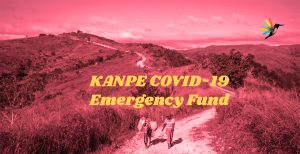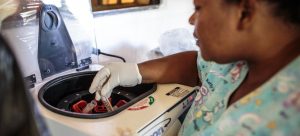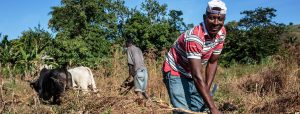KANPE’s COVID-19 Emergency Fund
KANPE’s COVID-19 Emergency Fund was created to respond to the effects of the pandemic in Haiti, and particularly in Baille Tourible. Our experience with the cholera outbreak in 2011, where over 1,700 cases were treated in our health clinic between 2011 and 2017, taught us that we must act quickly and decisively.
With cases already detected in Haiti, we must equip the health clinic with the means to protect its population and surrounding communities and work to reduce the effects of economic and food insecurity the pandemic and lockdowns will have on the country’s most vulnerable.
Anticipated impact of the COVID-19 global pandemic on Haiti
According to the United Nations, the likely impacts of the COVID-19 pandemic[1]and the Petrocaribe crisis of 2019 in Haiti will have severe humanitarian consequences with disruptions to access to food, clean water and health care, leading to increased violence and the destruction of livelihoods.
According to the World Food Programme, Haiti has one of the highest levels of food insecurity in the world. The FAO estimates that more than 5 million people will need urgent food assistance due to the COVID-19 crisis as decreased food production and exports worldwide will affect 70% of Haiti’s food supply that is imported from mainly the US and the Dominican Republic. The Haitian gourde has depreciated drastically compared to the American dollar, increasing the price of food by 25% in the last few months[2]. Already, 80% of the population suffers from disease due to malnutrition and unsafe drinking water. his is coupled with environmental degradation from years of overcutting and climate change, making the effects of the COVID-19 pandemic a perfect storm of a precarious health care system, food insecurity and climate change.
KANPE’s Emergency Response Plan for COVID-19 in Haiti
PREVENTION AND HEALTH CARE
In Baille Tourible, KANPE works with local partner Zanmi Lasante (Haitian branch of Partners in Health) whose mission is to restore social justice by bringing quality health care to the most vulnerable communities.
Opened since 2011, the health clinic offers care and prevention services to over 17,000 people in Baille Tourible and the surrounding communities, and provides approximately 7,000 consultations per year. It treats over 170 children per year for moderate to severe malnutrition. The clinic also provides prenatal and family planning services to over 800 people per year. The health clinic in Baille Tourible was a regional leader in the containment of the cholera epidemic that devastated Haiti in the aftermath of the 2010 earthquake. Over 1,700 cases were treated in the clinic and no cases have been detected since January 2018.
In response to the COVID-19 pandemic, KANPE is scaling up its capacity to help the most vulnerable and save lives in the community where we work. We are diligently working with our local partner Zanmi Lasante to prepare and equip the medical staff in the clinic and increase prevention measures against COVID-19 while ensuring we can continue to fund the annual operational costs of running the health clinic.
FOOD SECURITY
KANPE and local partner Mouvement Paysan Papaye (MPP) have been working together in Baille Tourible to increase food security for the community. Over the last few years, together we have acquired land for the construction of an experimental farm, distributed seeds to over 250 farmers as well and purchased nearly 3,300 farm animals. Our activities include trainings in agriculture, and soil and water conservation techniques, and reforestation. Since 2017, KANPE and MPP have produced and planted 18,000 seedlings. Activities have garnered the participation of local youth (including a climate march retweeted by activist Greta Thunberg) and the implementation of monthly waste collection activities.
In response to the COVID-19 pandemic, KANPE is working with MPP to support vulnerable families as well as the farmers of Baille Tourible in an effort to prevent food insecurity and revenue loss. This includes:
-
- Integration of 250 additional families into the seed bank program which loans black bean seeds to local farmers;
- Purchase and redistribution of seeds for millet and corn to reduce dependence on imported cereals for 500 families;
- Development of subsistence gardens (jaden lakou) for 500 families to grow their own food and sell surpluses at local markets;
- Planting of manioc – a highly nutritious and fast growing plant that grows well in semi-arid conditions and naturally insect-resistant;
- Planting and replacement of aging citrus trees in Baille Tourible for reforestation, food and extra revenue when fruits are sold at the local market;
- Stockings and purchase of food supplies to help the most vulnerable in the community;
- Distribution of food supplies for the most vulnerable segments of the population;
- Purchase and distribution of seeds for farmers.
INCREASED SUPPORT FOR WOMEN
KANPE is also very concerned that women will bear the burden of this global health pandemic which risks exacerbating existing gender inequalities. According to UNFPA[3], given women’s role in providing most of the informal care in families, we can expect most women to look after sick family members and children which will limit their work and economic opportunities and increase their risk of exposure to the virus[4]. KANPE will support the three women’s associations of Baille Tourible. This includes:
-
- Ensuring the women have access to interest-free credit to strengthen income-generating activities in agriculture, livestock, and small business;
- Ensuring access to seeds for subsistence farming;
- Increased nutritional support for the most vulnerable and malnutrition kits for children.
[1] United Nations Population Fund
[2] https://www.unfpa.org/resources/covid-19-gender-lens
[3] https://www.unocha.org/sites/unocha/files/Global-Humanitarian-Response-Plan-COVID-19.pdf
[4] https://www.haitilibre.com/article-30597-haiti-economie-hausse-de-25-du-panier-alimentaire.html



